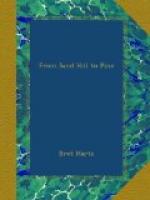“We must throw round for it,” said the foreman, taking the dice from his pocket.
He cast; the lowest number fell to Parkhurst, a florid, full-blooded Texan. “All right, gentlemen,” he said, wiping his forehead, and lifting the tin pail with a resigned air, “only ef anything comes to me on that bare stretch o’ stage road,—and I’m kinder seein’ things spotty and black now, remember you ain’t anywhar nearer the water than you were! I ain’t sayin’ it for myself—but it mout be rough on you—and”—
“Give me the pail,” interrupted a tall young fellow, rising. “I’ll risk it.”
Cries of “Good old Ned,” and “Hunky boy!” greeted him as he took the pail from the perspiring Parkhurst, who at once lay down again. “You mayn’t be a professin’ Christian, in good standin’, Ned Bray,” continued Parkhurst from the ground, “but you’re about as white as they make ’em, and you’re goin’ to do a Heavenly Act! I repeat it, gents—a Heavenly Act!”
Without a reply Bray walked off with the pail, stopping only in the underbrush to pluck a few soft fronds of fern, part of which he put within the crown of his hat, and stuck the rest in its band around the outer brim, making a parasol-like shade above his shoulders. Thus equipped he passed through the outer fringe of pines to a rocky trail which began to descend towards the stage road. Here he was in the full glare of the sun and its reflection from the heated rocks, which scorched his feet and pricked his bent face into a rash. The descent was steep and necessarily slow from the slipperiness of the desiccated pine needles that had fallen from above. Nor were his troubles over when, a few rods further, he came upon the stage road, which here swept in a sharp curve round the flank of the mountain, its red dust, ground by heavy wagons and pack-trains into a fine powder, was nevertheless so heavy with some metallic substance that it scarcely lifted with the foot, and he was obliged to literally wade through it. Yet there were two hundred yards of this road to be passed before he could reach that point of its bank where a narrow and precipitous trail dropped diagonally from it, to creep along the mountain side to the spring he was seeking.
When he reached the trail, he paused to take breath and wipe the blinding beads of sweat from his eyes before he cautiously swung himself over the bank into it. A single misstep here would have sent him headlong to the tops of pine-trees a thousand feet below. Holding his pail in one hand, with the other he steadied himself by clutching the ferns and brambles at his side, and at last reached the spring—a niche in the mountain side with a ledge scarcely four feet wide. He had merely accomplished the ordinary gymnastic feat performed by the members of the Eureka Company four or five times a day! But the day was exceptionally hot. He held his wrists to cool their throbbing pulses in the clear, cold stream




